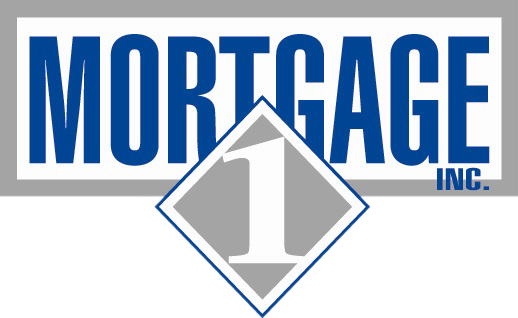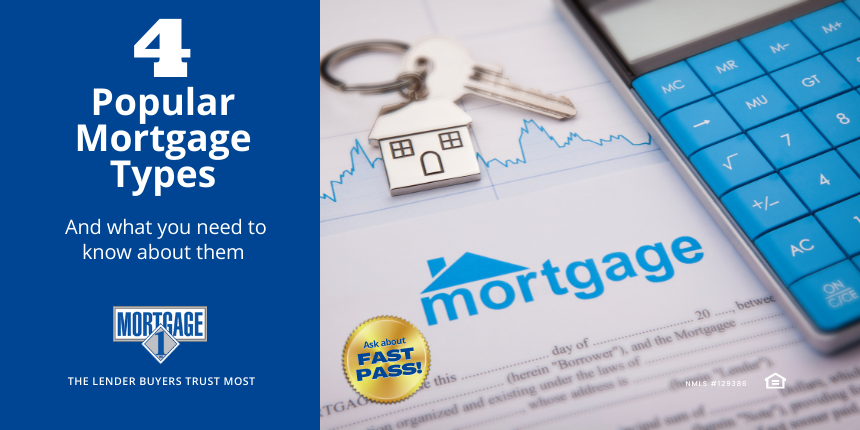
New FHA Guidelines Make Home Ownership Easier for Borrowers with Student Debt
November 3, 2021
What Is a USDA Loan?
November 17, 2021Home buyers have different needs and circumstances. Fortunately, there are several loan options to help you qualify for a mortgage!
While the conventional loan might be the most familiar mortgage type, it’s not the best choice for everyone. In this article, we’ll examine the four main types of mortgage loans and who should apply for them.
| You don’t have to figure out mortgage options on your own!
Mortgage 1’s experienced specialists have helped thousands of families navigate the complex world of home loans. Contact us today or call 866-532-0550 or locate a Mortgage 1 loan officer near you to discover why Mortgage 1 is the most trusted lender. |
What Mortgage Options Do You Have?
First, let’s discuss what mortgages have in common:
- All mortgages require you to provide proof of income. The guidelines around debt-to-income ratios (DTI, or how much your monthly debt payments are compared to your monthly income) and how much income you need may be different with each loan type. In any case, you’ll need to be financially able to make the monthly loan payments.
- Most mortgages require you to meet a minimum credit score. Again, the actual number varies depending on the loan type; this serves as an index of your creditworthiness (or financial trustworthiness).
- Most mortgages require a down payment, although there are ways for Michiganders to get help with their downpayment through the MSHDA Down Payment Assistance program.
- All mortgages require documentation of income and assets; this demonstrates your ability to repay the loan.
There are four main types of residential mortgage loans that Mortage 1 offers. Let’s start with the most, well, conventional of the group: The conventional loan.
Conventional Mortgage
Unlike the other types of mortgages we’ll discuss, a conventional mortgage is not insured by a government agency. It’s available from a private company or from Fannie Mae or Freddie Mac. Because it’s not secured by the government, a conventional mortgage usually requires a larger down payment (about 20%), a higher interest rate, a lower DTI, and a higher credit score.
On the plus side, conventional mortgages tend to have more flexible terms and can be obtained a bit faster than some of the other mortgage options (which can run up longer processing times because of the agencies involved).
Who should consider a conventional mortgage? Someone with an established credit history, a minimum credit score of 680-700+ (740+ is ideal), and a relatively low DTI (36% or less is best). A 20% down payment is preferred, but lenders may accept less if you have private mortgage insurance.
FHA Loan
Technically speaking, FHA loans (as well as USDA and VA loans) are not mortgages in themselves; that is to say, you’re not taking out a loan from the Federal Housing Administration or another government agency. Instead, the FHA is insuring your mortgage. The actual lender is a third party (like Mortgage 1).
FHA loans were developed to help people who work hard but don’t have the stellar financial background required by conventional loans. This means you can have a lower credit score (580, or even lower if you can provide a 10% down payment) and a lower down payment.
There are various types of FHA-insured loans, including the 203k Mortgage Program (which allows homeowners to borrow money to make energy-efficiency improvements to their home) and the Section 245(a) Loan (which is for home buyers who expect their income to increase over time; the monthly payments get larger over time).
On the downside, FHA loans can take longer to process and require mortgage insurance. There are also location-based limits on the loan amount. Your prospective home must also pass a FHA inspection and appraisal.
Who should consider a FHA loan? Someone who doesn’t have the pristine financial record required for a conventional loan. To qualify for an FHA loan, you can’t be delinquent in your student loan or income tax. You also can’t have any bankruptcy proceedings within the last two years or any mortgage foreclosures within the last three years.
VA Loan
A VA loan is a loan secured by the Department of Veterans Affairs. It’s provided through a third-party loan provider. Like FHA loans, VA loans have less stringent credit and financial requirements. Unlike FHA and conventional loans, they don’t always require a downpayment. They also tend to have lower interest rates and no requirement for mortgage insurance. And while the VA doesn’t establish a minimum credit score, the lender will make their own guidelines. You may also be required to pay a funding fee (usually a percentage of the loan amount) at closing. This may be added to the loan amount in some cases.
Who should consider a VA loan? U.S. military personnel on active, reserve, or National Guard duty, military veterans, and in some cases, surviving spouses. (Note: To qualify, a person must have served a certain number of active days during wartime or peacetime.) A Certificate of Eligibility (COE), which demonstrates proof of military service, is required.
USDA Loan / Rural Development Loan
Not everyone wants to live in a city or even the suburbs. If you’re looking for a home away from the urban sprawl but you don’t have a lot of cash available, a USDA loan is for you. LIke VA loans, you may not need a downpayment to qualify. Like FHA loans, you will need to meet creditworthiness and income guidelines – although less demanding than those for conventional loans.
A key part of a USDA loan is location; the property must be in an eligible rural area (generally, an area with a population under 35,000). Another factor is home size (usually under 2,000 square feet). For detailed requirements, see the Rural Development page. To see if you might qualify, use this USDA loan self-assessment tool.
Who should consider a USDA loan? If you’re low- to-moderate income, unable to secure a loan through other sources, and want to live in a rural area, the USDA loan program may help you make it happen.
Find Your Best Loan at Mortgage 1!
Mortgage 1 is one of Michigan’s leading USDA and MSHDA mortgage lenders. We’re very familiar with the available options, and our goal is to get you the best home loan possible. Give us a call!





